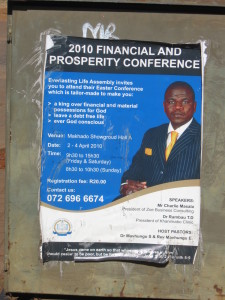To be nailed to the doors of any church with a name like “Glory Barn” or “Fire Tabernacle” or “Holy Ghost International Centre.”
Prosperity Gospel
- The prosperity gospel urges men to love money, comfort, or things of this earth whereas Jesus Christ and the apostles command men to lay up treasures in Heaven (Matt. 6:19-21), set your affections on things above (Col. 3:2), and count the Son of God as your treasure (Matt. 13:44).
- Doctrines such as the wrath of God, repentance, and humility are practically unknown in most churches in Africa.
- Men are encouraged to wear armbands for protection as if the “pastor” has some radiating life force that will protect them.
- Selling holy water bottled as salvation is a form of witchcraft.
- Promoting the pastor as a mediator between God and men is a form of witchcraft.
- Manipulating every text of Scripture so that it bears on earthly comfort or success is a form of witchcraft.
- Advertising public religious meetings with promises to be delivered from poverty, lack, sickness, disease, and barrenness is a form of witchcraft.
- An insult is done to the Word of God when a great amount of time is taken on the offering so that the minds of the hearers are dull during the sermon. Or when the sermon consists so greatly of discussions of things of this life that it amounts to another attraction of men’s hearts to money.
- I have been in several public “Christian” meetings where the offerings occupied more than 45 minutes of the time. Other pastors have told me that this is common in their region as well.
- Signs that advertise voodoo and witchcraft are practically indistinguishable from signs that advertise “Christian” crusades.
- A pastor at a funeral for the chief of the village in which I lived preached before hundreds of people that God was going to bring them all “blessings.”
- A crusade I attended in the village featured a dozen or more pastors from our village sitting in the front row. The preacher had the audience stand and shout if they wanted a new Toyota.
- A popular preacher in Zimbabwe promised a large crowd that money would be deposited in their bank accounts and would show itself by text messages to their phones.
- A pastor at a large church in Waterval invited a guest speaker from Nigeria. Though the pastor told me privately that he only preached the gospel, that evening the visitor told us only about money and success. He paused in the middle of his sermon to declare that he was healing a person in the audience who had a pain in her side.
- A man with pictures of his pastor all through his house and four on his vehicle, answered me with only four words when I asked when he was born again: “I am rich now.”
- A pastor at a crusade told the audience, “It’s boring in Heaven.”
- A man who worships at a prosperity church told me that they preach the gospel of Jesus Christ, but when I went to one of their services, there was no mention of repentance, humility, or the cross of Christ.
- The prosperity gospel teaches men that they have power and authority to create their own realities. It feeds their natural pride and lust for authority and control.
- Pastors are either indifferent to false doctrine or positively opposed to learning doctrine. They desire certificates to show that they are learned, but they have no interest in the actual teaching itself.
- A popular church near our house has two, 2-meter-high pictures of the pastor on the door. Inside, there are 4 more very large pictures of the same man including one about 3 meters high behind the pulpit.
- Church leaders commonly do not know where books of the Bible are, have not read the whole New Testament, and read their Bibles randomly.
- Church leaders sometimes gather the church around money.
- Pastors seek the most bizarre teachings and stunts in order to gain attention.

- The words of our Lord, “With God all things are possible” (Matt. 19:26) are usually taken to mean “We can all be rich and comfortable!” rather than, “God can save any sinner regardless of how hopeless it looks from man’s point of view.”
- Verses like “Blessed shall you be when you come in, and blessed shall you be when you go out” (Deut. 28:6) are separated from their context where Moses warns the people for 54 verses about the dangers of God’s curses on the people of God if they disobey.
- The false teachers prey on women (2 Tim. 3:6) by appealing to their sinful fears.
- Instead of pulling the meaning out of the text and offering the plain sense of the Bible to the people, prosperity preachers bring their own meaning to the text and offer those contortions to the people.
- Prosperity churches are by far the most common in the rural areas. Over 20 pastors and missionaries spread out over southern Africa from Tanzania to Mozambique, to Zambia, to Zimbabwe have all told me that nearly every pastor believes in prosperity.
- Prosperity preachers are not interested in theology. Though many of them are poor, generally, they will not read good books even if they are given for free. They will agree on any number of superficial points, but they are not able to explain what they believe about nearly every major doctrinal term in Scripture. Nor do they care to learn.
- The theology of prosperity has no respected standing or acceptance in church history at all.
African Traditional Religion
- Traditional religion in Africa “is purely eudemonistic, the religious ceremonies having as their sole aim material benefits connected with the terrestrial life, e. g. abundance, health, peace, and good sleep!”[1]
- Since prosperity theology is concerned with material benefits, it has the same goal as ATR.

- In ATR, the gods have physical power, but they do not rule or govern the world by laws. By so teaching men, the demons of this religion have robbed men of the very categories needed to produce science, technology, and cultural progress.

- The gods, which are nothing more than the spirits of the ancestors, expect obedience to traditions which means the way things were done when they were alive. But since these ways are passed down orally and not literally, and since lifestyles can shift from one generation to the next, ATR thus imprisons the mind in a free-flowing bondage to the ancestors.
- Syncretism is the blending of pagan religious customs with Christianity. Often the religious customs are couched in terms of culture, so that to oppose the practice is to oppose the culture. Those who don’t really want to change, can hide themselves behind their culture as if it has not been influenced by the religion.
- Syncretism is very common in southern Africa. This is not surprising since many peoples around the world have responded to the Christian gospel with a blending of the new message with their old, useless way of life that they inherited from their ancestors. The OT Jews blended religions (2 Kings 17:32-33, 41). In northern Africa, Islam was blended with ATR.
- Like many false religions, ATR can absorb other religious ideas without changing much.
- Many men are pastors, but they still share a fear of spirits, and their ministries are often dominated by discussions of what the spirits have done, and how to get around the spirits.[2]
- Sermons and books from professing Christians that treat topics around spirits, generational curses, witchcraft, and traditional practices are not built on a Biblical theology.
- The goal of ATR is the same as the prosperity religion: health, wealth, and comfort.
- The authority of ATR is the same as the prosperity religion: traditions, visions, personal impressions.
- The means of ATR is the same as the prosperity religion: certain rituals and words.
- The mediator of ATR is the same as the prosperity religion: powerful men who have a special connection with the spirits.
- Famous pastors teach that men are little gods. In ATR the distinction between gods and men is very thin, so too in prosperity theology.
- A pastor near Harare told me that it is very common to see Baptists in Zimbabwe go to prophets in order to have a blessing placed on their job or car or family.
- Africa’s problems come from false religion. If every person were a true believer, the continent would have no serious problems.
- Even though all cultures and religions outside of Christianity are useless ways of life (1 Pet. 1:18), professing Christians will not accept this message happily even though it may allow many other people to remain trapped in a false religion.
- Though Scripture commands us to fear God alone (Pro. 1:7; Luke 12:5), a fear of witchcraft is very common among professing Christians.
- When problems come in life, the immediate response of many who attend church is to trace the cause to the work of evil spirits.
- ATR finds its greatest concern with poverty whereas Jesus warned that Satan’s great work was to steal the truth of the gospel from the hearts of those who hear it (Matt. 13:19).
- ATR has no category for an immutable, absolute, single Spirit who controls the entire world. Because of this demonically structured worldview, it is particularly difficult to receive the most basic teachings of Christianity even though the superficial aspects of Christianity can be added to the previous way of life without much chance.
- ATR destroys personal responsibility because the sinner is taught to blame the spirits for everything. In ATR, poverty doesn’t come from my own foolish choices, but from the capricious whim of dead people.
- ATR destroys knowledge and certainty because the world is not controlled by unchanging laws from the mind of an absolute Creator.
- ATR destroys the impulse to art because there are no transcendental glories in this religion.
Ecumenism
- The ecumenical attitude that allows men to be counted as Christians without a Biblical test of their faith accepts Christianity that is really nothing more than syncretism.
- Refusing to mark false teachers while claiming to preach the gospel yourself blurs the definition of the gospel.
- When ridiculous, unchristian things are said and done, the majority of pastors remain silent. They do not follow our Lord who rebuked the Pharisees publicly (Matt. 23) nor Paul the apostle who named false teachers (1 Tim. 1:20).
- During church services, crusades, and on television, the speakers will commonly refer to everyone present as a Christian or a believer or someone receiving God’s blessings.
- When a speaker gives false teaching from the pulpit, the church members are silent.
- New churches start simply because one man wants more power, not because he believes or practices anything different from another church.
- Most pastors are prepared to unite with anyone who can help them financially regardless of their beliefs.
- If a pastor does have a doctrinal statement, then usually it is broad enough to allow fellowship with any false pastor who merely calls himself a Christian.
- Though Paul tells us to mark and avoid false teachers (Rom. 16:17), most people ignore this teaching and condemn those whom they think are “judging.”
- When a pastor does speak boldly about false teachers and the purity of the gospel, nominal Christians will accuse him of sinfully judging.
- Many prosperity pastors will talk as agreeably as possible until you mention the names of prominent false teachers and denounce them as children of hell (Matt. 23:15), pigs (Matt. 7:6), and dogs (2 Pet. 2:22). They will try to be agreeable with everyone (Luke 6:26) including enemies of the cross of Christ (Phil. 3:18).
- Even if one church or denomination does not openly practice the worst parts of prosperity theology, they quietly accept those who come from false churches as if they were true Christians.
- There seem to be three broad groups of churches in Africa: prosperity churches, churches that teach and love the 5 Solas of the Reformation, and churches that sometimes speak truthfully and sometimes speak about prosperity. The first group contains unbelievers, the second group—though very small—believers, and the third group is so close to the unbelievers that their conversion is doubtful.
Positive Confession
- The prosperity gospel encourages men to “speak faith,” to claim healing and deliverance, to shout the divine name in prayer, to repeat the divine name many times, and to talk much of such broad topics as blessings, success, power from God, and greater works.
- “God-talk” offends the one true God since it takes His name, words, and works in vain.
- All of these practices are condemned in the 3rd of the 10 Commandments and Jesus’ teaching on prayer in the Sermon on the Mount.
- Pastors intentionally use vague terms in order to sound “Christian” while still tickling people’s natural desires. “Power meets Power.” “The Year of Moving to Higher Levels of Maintaining Them.” “I have the grace, you can’t stop me!”
- Churches take vague extra-biblical themes like “The Year of Fulfillment” that are intentionally chosen to move the people to think about prosperity, but they do not choose obvious Scriptural themes such as “The Year of Repentance” or humility or exalting Christ or preaching the gospel.
- Biblical prophets denounce specific sins, but the average pastor talks generally about blessing and peace and comfort (Jer. 6:14).
- The false gospel is so prevalent through media and churches that many people are afraid of speaking realistically about sin, its consequences, or the actions of sinners.
- Their loyalty to positive confession permits them to overlook all the passages in Scripture that have to do with God’s judgment, retribution, and curses.
- In the average church today, the pastor repeats certain terms that indicate his theological location. Blessing, success, prosperity, the next level, and nearly any other word that sounds positive. Biblical expressions like “You will be the head and not the tail” (Deut. 28:13).
Miracles
- Pastors prepare their “miracles” as if they are entertaining people.
- Some pastors promise to perform grotesque and absurd “miracles” like causing people to vomit blood, to experience a full pregnancy in 3 days, or even to heal people with Doom bug spray.
- Pastors entertain people by “casting out demons” using the same hand motions and phrases that other pastors use. They manipulate the circumstances in order to look like a show.
- Some pastors are even visible on the internet “throwing the Holy Ghost.” I have also seen that in smaller crusades in the village.
- Many people involved in these miracles are merely acting.
- The miracles that many churches practice heal invisible problems rather than healing visible diseases like leprosy (Matt. 8:3), calming storms (Matt. 8:26), and raising the dead (Luke 7:14-15).
- The miracles come at the end of the services as a climax to an evening of entertainment rather than before the preaching as the apostles often did. In Scripture, miracles did not overshadow the preaching of the gospel (Acts 3:1-12; 8:6; 13:11-12).
- If they really have this miraculous power, then why do they not heal everyone at the hospital or clinic? If they say, those people cannot be healed because they have no faith, then does that mean that not one person in the hospital has faith? If so, then they are adding insult to those who are injured.
- The natural, God-given intelligence of men is insulted by the fanciful nonsense that is authoritatively offered as miracles and works of God.
The Fruit of the Spirit
- Pastors are commonly boastful and full of challenges and envy even though these are marks that someone is walking in the flesh (Gal. 5:26). Many small churches are started that have the same theology as every other church, but nevertheless they cannot unite because each “pastor” wants to have the eyes on him.
- The first word of the Sermon on the Mount calls for humility, but pastors would prefer to be seen in flashy suits, hold microphones rather than wear them, and print large pictures of themselves.
- Many pastors speak about themselves. When their people are asked about conversion, they commonly respond with some work that they have done, and very rarely mention anything about Jesus Christ.
- The pastors do not model humility because they are unconverted. Also, they realize that the people will not be attracted to humility because they themselves are proud.

- The pictures that are used to promote churches draw attention to the pastor’s power, authority, and ability.
- The pastor is always presented as the great visionary, the man who is greater than the church members, the one who can bring down power from God.
- Verses having to do with women pastors or the control that God established over tongues in the church are ignored and contradicted.
- Pastors threaten people who leave the church that they “are leaving the umbrella of protection” so they may lose a job, have a health disaster, or even die.
- Several of the richest pastors in South Africa—the richest country on the continent of Africa—come from the poorest countries like Malawi and Nigeria.
Conclusion
- When pastors should be known for preaching the gospel, hating sin, identifying false teachers, and supreme love for the Lord Jesus Christ, they are instead known for their clothes, lifestyle, money, swagger, influence, and uncanny ability to discover new ways to bind men’s hearts to this earth.
Notes
[1] Junod, vol. 2, 428.
[2] From the first sentence of the first page of Olukuya, D. K., Power Must Change Hands. 2010, page 1 and throughout the book. See also Maimele, from the title and throughout the book; Masuka, T. P. from the second sentence of the book and throughout. In fact, the majority of books that I have seen by African pastors all are dominated by discussions of spirits.











Satan’s craft and power are great.
May these courageous, insightful words scatter his demons in Africa’s prosperity churches.
buy generic cialis